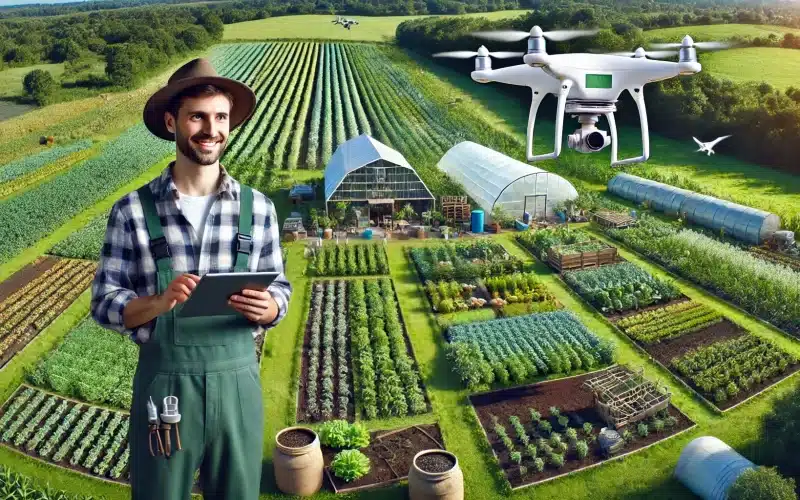
Organic farming is widely celebrated for its environmental and health benefits, such as reducing chemical use and promoting biodiversity. However, it faces a lot of challenges that hinder its widespread adoption and long-term sustainability.
Resistance to Embrace Science
Lower crop yields, higher labor costs, and difficulties in managing pests and diseases are major obstacles. Additionally, organic farmers often struggle with nutrient management, economic viability, and navigating the complex certification process. These issues can make organic farming less competitive compared to conventional methods.
To address these challenges and unlock the full potential of organic farming, science is stepping in with innovative solutions and research. Here’s how science and organic farming are working together to create a more sustainable future.
Unfortunately many organic farmers are wary of adopting scientific advancements due to the perceived complexity and the fear of losing traditional, hands-on methods. Additionally, there is a cultural divide where adopting new technologies can sometimes be stigmatized within farming communities. Overcoming these concerns requires demonstrating the practical benefits of scientific innovations in a way that aligns with the values of organic farming.
Coincidently today the citizens movement WePlanet tweeted this.
We've all seen the claims—organic is better for the environment—but is it really?
— WePlanet (@weplanetint) July 19, 2024
Making sustainable purchasing decisions can be tricky, especially when there is so much greenwashing. So, WePlaneteer Iida is here to see what the science says about organic sustainability. pic.twitter.com/GUTtVuH3V0
Boosting Yields and Productivity
One of the main criticisms of organic farming is its lower yields compared to conventional methods. Science is addressing this by developing crop varieties tailored for organic systems. These crops are more resistant to pests, diseases, and environmental stresses. By involving farmers in the breeding process, scientists ensure these new varieties meet the specific needs of organic farms.
Additionally, advancements in soil health management are crucial. Researchers are creating more effective organic soil amendments, like biochar and improved composting techniques. These amendments enhance soil fertility, which is key for increasing crop yields.
Tackling Pests and Diseases
Organic farmers have fewer options for pest and disease control since they avoid synthetic chemicals. Science is stepping in with biological control methods, using natural predators and biopesticides derived from plants, bacteria, and fungi. These solutions provide effective pest control without harming the environment.
Integrated Pest Management (IPM) combines cultural practices, like crop rotation and intercropping, with advanced monitoring tools. This approach helps farmers manage pests more effectively and sustainably.
Enhancing Nutrient Management
Efficient nutrient management is a cornerstone of successful organic farming. Precision agriculture techniques help optimize the use of organic fertilizers, ensuring crops get the right nutrients at the right time. Cover crops, which improve soil fertility and control weeds, are also a focus of ongoing research.
Innovations like slow-release organic fertilizers and recycling agricultural waste into nutrient-rich compost are making organic farming more efficient and sustainable.
Supporting Economic Viability and Market Access
Transitioning to organic farming can be risky and expensive. Scientific research is exploring financial incentives, such as subsidies and grants, to support farmers during this transition. Risk management tools tailored to organic farming conditions are also being developed.
Improving organic certification processes reduces costs and barriers for farmers, making it easier to enter the organic market. Consumer education campaigns based on research into consumer preferences help increase demand for organic products, benefiting farmers economically.
Reducing Environmental Impact
Organic farming can have a positive environmental impact, therefore science is working to enhance this further. Research into climate-smart practices, like carbon sequestration and greenhouse gas mitigation, is helping organic farms become even more sustainable.
Agroecological approaches, which integrate biodiversity and ecosystem services, are being promoted to improve productivity while conserving natural resources. Studies on land use efficiency are helping balance the needs of agriculture and biodiversity conservation.
Leveraging Technological Innovations
Technology is playing a significant role in advancing organic farming. Digital tools and farm management software help farmers manage their operations more efficiently. Remote sensing and drone technology provide real-time monitoring of crop health, soil conditions, and pest outbreaks.
Genomic tools are enhancing our understanding of plant and soil microbiome interactions, leading to better crops and farming practices. Non-GMO biotechnologies, like marker-assisted selection, are also being explored to benefit organic farming.
Science and Organic Farming, a Powerful Combination
Science and organic farming are proving to be a powerful combination. By addressing the challenges of organic farming through research and innovation, we can create more sustainable and productive agricultural systems. This collaboration not only benefits farmers but also contributes to a healthier environment and a more resilient food system. As science continues to advance, the future of organic farming looks promising and bright.
And that it is a subject that keeps people preoccupied since quite some time shows this video from 2016.
